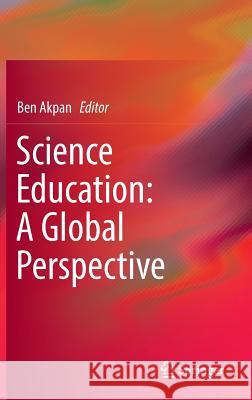Science Education: A Global Perspective » książka
Science Education: A Global Perspective
ISBN-13: 9783319323503 / Angielski / Twarda / 2016 / 357 str.
Science Education: A Global Perspective is global both in content and authorship. Its 17 chapters by an assemblage of seasoned and knowledgeable science educators from many parts of the world seek to bring to the fore current developments in science education and their implications. The book thus covers a wide range of topics in science education from various national and international perspectives. These include the nature of science, science and religion, evolution, curriculum and pedagogy, context-based teaching and learning, science and national development, socially-responsible science education, equitable access for women and girls in science and technology education, and the benefits of science education research. It ends on an optimistic note by looking at science education in 50 years time with a recommendation, among others, for stakeholders to take the responsibility of preparing children towards a blossoming science education sector in an anticipated future world. This book is suitable for use by discerning researchers, teachers, undergraduate and postgraduate students in science education, and policy makers at all levels of education. Other educationalists and personnel in science and technology vocations will also find it interesting and useful as the reader-motivated approach has guided the presentation of ideas. Science Education: A Global Perspective is a rich compendium of the components of science education in context, practice, and delivery.
Dr Bulent Cavas, Professor of Science Education, Dokuz Eylul Univerity, Buca-Izmir, Turkey/President-Elect, International Council of Associations for Science Education (ICASE) This book will be of immense relevance for current and future global strides in training and research in science education.
Surinder K. Ghai, Chairman, Sterling Publishers Pvt. Ltd., New Delhi, India This book provides a refreshing insight into the current status and future direction of science education. It will be very useful to researchers, those pursuing undergraduate and post-graduate courses in science education, and all other personnel involved in the policy and practice of science education.
Dr. Bennoit Sossou, Director/Country Representative, UNESCO Regional Office in Abuja, Nigeria"











